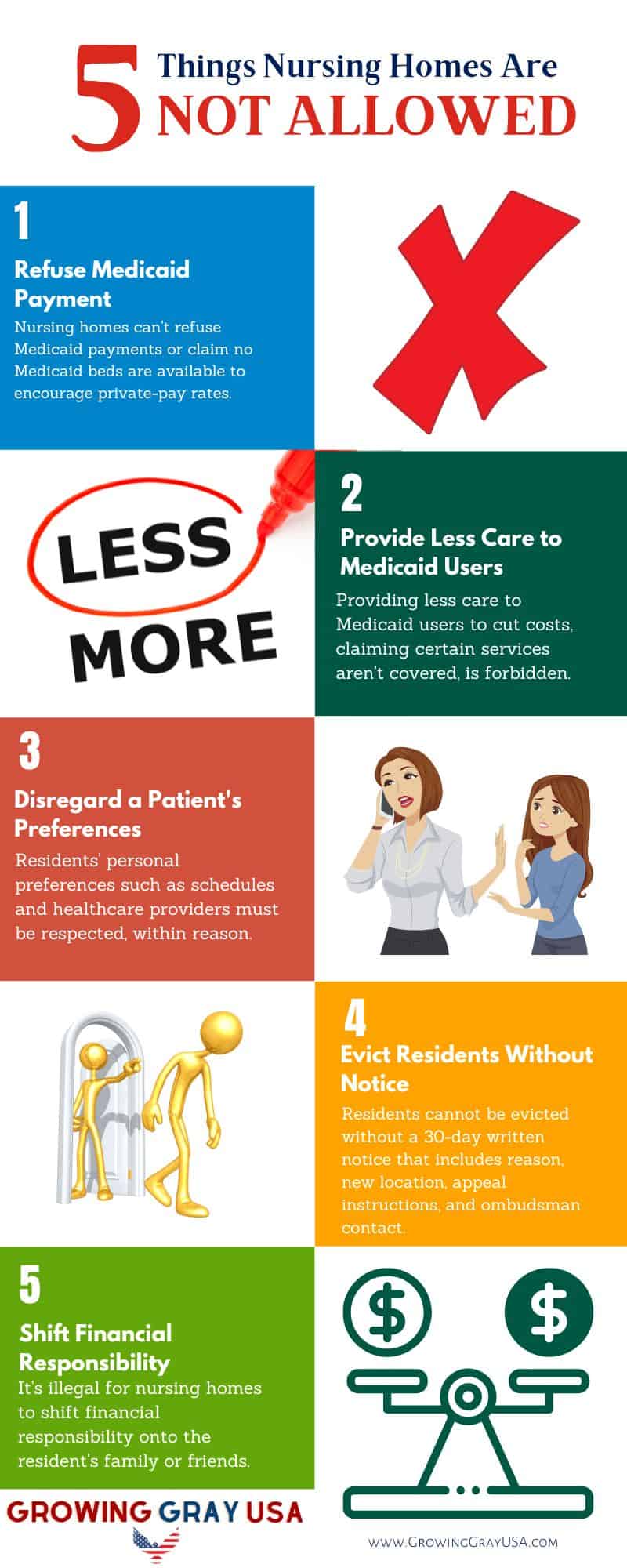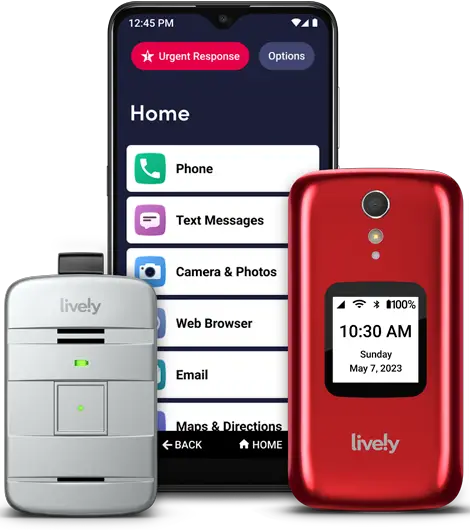This post contains affiliate links.
Nursing homes are supposed to be safe havens for loved ones who require advanced care when you’re not in a position to provide it. Unfortunately, some nursing homes don’t always play by the book, resulting in poor care for your loved one.
Nursing homes are not allowed to refuse Medicaid or provide less care to Medicaid users. They also cannot refuse to provide necessary services or disregard a patient’s preferences. Moreover, they cannot force the resident’s family to take on financial responsibility.

Read on for a comprehensive overview of the things a nursing home isn’t allowed to do so you can hold them accountable if they violate your rights. If you believe those rights are being violated, know that you always have legal recourse — which I’ll also discuss in more detail in this article.
1. Nursing Homes Aren’t Allowed To Refuse Medicaid Payment
Almost all nursing homes in the country accept Medicaid payments. That’s because most residents of the United States have either Medicare or Medicaid. (Note my use of the word “resident”: Whether you’re a citizen of the United States or not, you’re entitled to Medicare or Medicaid if you meet the minimum requirements for either.)
Medicaid is a government-sponsored program that helps to cover medical fees for low-income individuals, including those in nursing homes. However, some of these homes, in a bid to make a profit, claim that they don’t have Medicaid beds available when you ask.
They do that to encourage you to pay at the private-pay rate, which means getting a lot more out of your pocket. As you can see, this is an unscrupulous practice, as nursing homes can request the certification of additional Medicaid beds at any time.
In other cases, a patient can start off as a private-pay resident. However, as their resources dwindle, they can eventually become eligible for Medicaid. In the event the resident is no longer able to pay out of pocket, they’re allowed to request to be moved to a Medicaid-certified bed.
Some nursing homes bank on residents not knowing about that clause and attempt to evict the resident due to nonpayment.
However, a nursing home is supposed to transfer the formerly private-pay resident to a Medicaid bed upon request. And if they currently don’t have any beds, they should ask for additional Medicaid-certified beds.
Fortunately, there are ways to avoid this. For starters, when choosing a nursing home, one of the first considerations should be whether it accepts Medicaid payment and, if so, whether the payment is full or partial. This way, a resident can confidently go to the nursing home knowing they accept Medicaid payments.
You can use the Care Compare website to check whether a nursing home is Medicaid-certified. Care Compare is a federal government resource that helps people looking for nursing homes to compare different facilities to find one that fits their needs best.
If a private-pay resident is looking to transfer to a Medicaid-certified bed, they should notify the facility well in advance of receiving their Medicaid certificate. They should make that request at least two months before becoming eligible for Medicaid, allowing the nursing home to make the necessary arrangements for a Medicaid-certified bed. Doing that will ensure a smooth transition from private pay to Medicaid once they become eligible.
If a resident does the above and the nursing home denies their request, the resident is allowed to file a grievance against the nursing home.
If filing a grievance sounds like an enormous waste of time and money, you can also enlist the help of the long-term care ombudsman program, which advocates for nursing home residents for free. Consult the National Long-Term Care Ombudsman Resource Center website for details about your specific state’s program.
2. Nursing Homes Cannot Provide Less Care To Medicaid Users
Some unscrupulous nursing homes do the bare minimum for Medicaid-eligible residents to cut costs. As you can imagine, cutting corners in patient care not only significantly reduces their quality of life but also puts them at risk of passing away prematurely due to inadequate care.
So, why would a nursing home say that it accepts Medicaid-eligible residents but not bother to provide them the care that they require?
It’s all about the dollars. Nursing homes typically apply for a Medicaid certification to allow them to receive money from the government to care for Medicaid-eligible patients. This way, the facility is assured of a consistent source of revenue.
Unfortunately, some nursing homes might provide a patient with only the minimum care possible to reduce the costs of caring for a Medicaid-eligible resident, thus making a profit. They might even go as far as claiming that Medicaid doesn’t cover some types of care, e.g., one-on-one attention or physical therapy.
One of the reasons nursing homes cite when trying to justify why they cannot provide Medicaid-eligible residents with extensive care is that the amount of money they receive from the government is too little to cover all types of care. They claim that they typically lose money caring for Medicaid users.
However, that is in direct contradiction with the promise they make when applying for a Medicaid certificate, which is to provide care in accordance with the Nursing Home Reform Law.
The Nursing Home Reform Law explicitly states that nursing homes should seek to establish and adhere to identical policies and procedures when providing services to their residents regardless of payment source, including Medicaid.
As such, if a nursing home signs up for Medicaid, it should be ready to serve Medicaid-eligible patients as they would private-pay residents.
Therefore, you should not accept inadequate care by a nursing home, as it’s your right to receive proper care. If a nursing home abuses that right, you should file a grievance against the facility or request the help of your state’s ombudsman.
3. Nursing Homes Cannot Disregard a Patient’s Preferences
Aside from discrimination against Medicaid-eligible residents, nursing homes have also been known to be run like military camps, requiring patients to follow a strict schedule. Doing so allows these facilities to have an easier time providing care for the residents.
However, one must consider the quality of life of a nursing home resident. They probably feel like they are in a jail of sorts since they need to be there. As such, the least you could do to improve their quality of life is to give them the freedom to make their own choices.
In fact, the Code of Federal Regulations states that nursing home residents should retain the right to choose their sleeping schedule, activities, and even health care providers.
Therefore, a nursing home is required by law to make “reasonable” adjustments to accommodate a patient’s preferences. However, the term “reasonable” is rather vague. What exactly does that mean, especially in a legal context?
“Reasonable” depends on the amount of effort required to meet the resident’s wishes. Suppose a patient wishes to stay up late into the night and wake up late the following morning. In that case, it’s reasonable to expect the facility to adapt to the patient’s schedule. For example, the nursing home could adjust one of its nurses’ schedules accordingly.
That said, some requests can be unreasonable. Therefore, to avoid potential conflicts, residents and their representatives are advised to explain how the changes they request would benefit the resident.
If the nursing home and the resident are unable to come to an agreement, the resident should consider filing a grievance.
That said, more and more nursing homes are embracing the idea of allowing their patients freedom of choice as long as it is within reasonable limits. Such nursing homes realize that by increasing their residents’ independence, they end up making them happier.
Doing that also serves the nursing home’s bottom line since happier residents often translate to more admissions due to a good reputation.
4. Nursing Homes Cannot Evict Residents Without Notice
Unfortunately, unethical evictions from nursing homes are relatively common. An unethical eviction doesn’t always mean being forcefully kicked out of the nursing home and left on the streets. It can be being told you are supposed to move out in a few days.
Regardless of the reason for the eviction, a nursing home is supposed to give you written notice in advance. The nursing home should issue the notice at least 30 days before the planned eviction date.
A proper eviction notice from a nursing home should contain the following details:
- The reason for evicting the resident
- The date of eviction
- Where the patient will be transferred to
- How the resident can appeal the eviction
- Contact information for the state’s ombudsman program
It’s important to note that a nursing home has only five grounds on which it can evict a resident. They include:
- The facility is going out of business.
- The resident cannot pay their fees.
- The resident no longer requires the nursing home’s services.
- The resident is a threat to others.
- The nursing home isn’t equipped to provide the patient with proper care per their needs.
So, is there anything a resident can do if they feel the reason for eviction is unfair? Fortunately, there is. A resident has the right to appeal their eviction.
As such, the first thing a resident should do when they receive an eviction notice is to ensure it has all the elements of proper notice. That means it should be given well in advance of the planned eviction date, should contain details about the resident’s appeal rights, and the contact information of the state’s ombudsman program.
If the resident decides to appeal the eviction, they should request an appeal hearing. This request should be made to the state’s ombudsman program, which should be clearly stated in the notice.
If the nursing home doesn’t provide that information, the resident can request their representative to help them search for their state’s ombudsman contact information on the internet.
A hearing officer will then decide whether the eviction is justifiable.
Nursing homes can also refuse to take a patient for the same reasons as eviction. So, you should carefully do your research to choose the best nursing home based on your elderly parent’s condition. Click on the link to read more. Could a Nursing Home Refuse to Take a Patient?
5. Nursing Homes Cannot Shift Financial Responsibility
Some nursing homes use every trick under the sun to squeeze all the pennies they can out of a resident and their family or friends. One of those tactics entails tricking a resident’s family into signing an agreement that makes them financially responsible for the patient’s expenses.
Regardless of how a nursing home puts it, the Nursing Home Reform Law considers such a practice unethical. That’s because the law states that a nursing home cannot require or request a patient’s family or friend to take on financial liability for the nursing home expenses.
In fact, the only reason for a resident’s family member, friend, or representative to sign a nursing home’s papers is if they’re acting on behalf of the resident. That means they would be committing the resident’s money on his/her behalf.
That law is there for a reason. Nursing homes cannot suffer losses if a patient is no longer able to pay for their expenses since Medicaid pays for such circumstances.
As such, by asking a family member or friend to assume financial responsibility, the nursing home will be looking to make money from both the resident’s family and the government.
You should be wary when signing nursing home papers for your resident loved one since you can easily be duped into committing yourself as a guarantor. For example, some nursing homes leave a space for the “Responsible Party” to sign.
At first glance, it might look like a harmless inclusion. That’s because it’s made to look like the nursing home is simply interested in getting the contact details of the resident’s next of kin or representative.
However, they might deliberately hide the definition of “Responsible Party” somewhere in the middle of the admission agreement, which might state that a “Responsible Party” is someone who is liable for the patient’s expenses.
That is why it’s critical to comb through a nursing home’s documents so you can know what you will be getting yourself or a loved one into. Remember, you have the right to refuse to sign unless you’re doing it for your loved one.
“That being said, while nursing homes can provide critical care, the concept of aging in place is gaining more recognition. This concept revolves around older adults staying in their homes longer, using products and services that can help them maintain their independence. One such product that can be invaluable for seniors who are aging in place is the Jitterbug phone by Lively. This senior-friendly cell phone not only allows for easy communication with loved ones but also offers an urgent response service at the touch of a button. Whether the user has fallen or is in any distress, they can immediately connect with certified agents who can dispatch the necessary emergency services. Along with that, Lively offers medical alert devices which also help in providing security and peace of mind to both the seniors and their family members. You can find out more about the Jitterbug phone and other products that aid seniors at the Lively website. With these resources, your loved ones can enjoy their golden years with greater independence, safety, and confidence.”
Tenuto Properties LLC dba Growing Gray USA is a participant in the Amazon Services LLC Associates Program, an affiliate advertising program designed to provide a means for sites to earn advertising fees by advertising and linking to Amazon.com. We also participate in other affiliate programs which compensate us for referring traffic.




